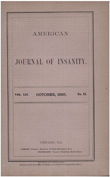Pharmacologic management of psychiatric illness during pregnancy: dilemmas and guidelines
Abstract
OBJECTIVE: Given concerns about use of psychotropic medication during pregnancy, the authors reviewed the literature regarding the effects of prenatal exposure to psychotropic medications on fetal outcome. METHOD: A MEDLINE search of all articles written in English from 1966 to 1995 was performed to review information on the effects of psychotropic drug use during pregnancy on fetal outcome. Where sufficient data were available and when methodologically appropriate, meta-analyses were performed to assess risk of fetal exposure by psychotropic medication class. RESULTS: Three primary effects are associated with medication use during pregnancy: 1) teratogenicity, 2) perinatal syndromes (neonatal toxicity), and 3) postnatal behavioral sequelae. For many drug classes there are substantial data regarding risk for teratogenicity. Tricyclic antidepressants do not seem to confer increased risk for organ dysgenesis. The available data indicate that first-trimester exposure to low-potency phenothiazines, lithium, certain anticonvulsants, and benzodiazepines may increase the relative risk for congenital anomalies. However, the absolute risk of congenital malformations following prenatal exposure to most psychotropics is low. CONCLUSION: Exposure to certain psychotropic drugs in utero may increase the risk for some specific congenital anomalies, but the rate of occurrence of these anomalies even with the increased risk remains low. Use of psychotropic medications during pregnancy is appropriate in many clinical situations and should include thoughtful weighing of risk of prenatal exposure versus risk of relapse following drug discontinuation. The authors present disorder-based guidelines for psychotropic drug use during pregnancy and for psychiatrically ill women who wish to conceive.
Access content
To read the fulltext, please use one of the options below to sign in or purchase access.- Personal login
- Institutional Login
- Sign in via OpenAthens
- Register for access
-
Please login/register if you wish to pair your device and check access availability.
Not a subscriber?
PsychiatryOnline subscription options offer access to the DSM-5 library, books, journals, CME, and patient resources. This all-in-one virtual library provides psychiatrists and mental health professionals with key resources for diagnosis, treatment, research, and professional development.
Need more help? PsychiatryOnline Customer Service may be reached by emailing [email protected] or by calling 800-368-5777 (in the U.S.) or 703-907-7322 (outside the U.S.).



